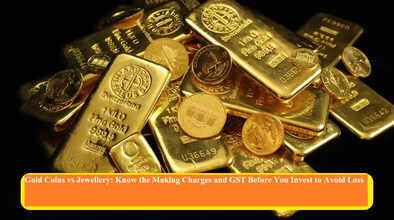Gold Coins vs Jewellery: Know the Making Charges and GST Before You Invest to Avoid Loss

For Indian households, gold is more than just a precious metal—it is a trusted form of investment and financial security. But when it comes to buying physical gold, the big question arises: should you buy jewellery or gold coins? While jewellery has cultural and emotional value, gold coins are often considered a smarter investment option.
One of the biggest reasons behind this choice is the difference in making charges and Goods and Services Tax (GST), which can significantly impact your total cost and resale value. Here’s everything you need to know before you invest in gold coins.
Why Gold Coins Are Better Than Jewellery
Buying gold jewellery usually comes with high making charges, often ranging between 10% and 20% of the gold price. These charges are non-recoverable, meaning when you sell the jewellery, you don’t get back the amount you paid as making charges.
In contrast, gold coins carry much lower making charges, generally around 5%, making them a cost-effective and investment-friendly choice. Moreover, coins are easier to resell because they are valued more for their gold content rather than design or craftsmanship.
Making Charges and GST on Gold Coins
Tanishq Gold Coin Example
On September 29, 2025, Tanishq listed a 10-gram, 22-carat gold coin priced at ₹1,14,909. The breakdown is as follows:
-
Gold price: ₹1,06,250
-
Making charges: ₹5,312.50 (about 5% of gold price)
-
GST: ₹3,346.88 (3% applied on gold price + making charges)
This means the buyer is paying over ₹8,600 extra above the gold value due to making charges and GST. Still, this is much lower than what you would pay for jewellery.
PC Jeweller Gold Coin Example
Similarly, on September 29, 2025, PC Jeweller listed a 1-gram, 24-carat gold coin for ₹12,753. The cost structure included:
-
Gold price: Approximately ₹11,740
-
Making charges: ₹639 (slightly above 5%)
-
GST: ₹374 (3% applied on gold price + making charges)
Again, the making charge is close to 5%, reinforcing that gold coins are comparatively cheaper to buy than jewellery.
GST on Gold Purchases
Whether you buy jewellery or gold coins, GST is mandatory at the rate of 3% on the total price (gold value + making charges). This tax increases the overall cost of purchase but cannot be avoided.
For coins, since making charges are lower, the GST component also remains lower compared to jewellery.
Impact on Resale Value
The real difference between jewellery and coins emerges during resale.
-
Jewellery resale: Since making charges are not recovered, selling jewellery often means losing 10–20% of your investment value upfront. Some jewellers may also deduct additional charges depending on wear and tear or design.
-
Coin resale: Coins fetch a higher return as they are valued closer to the actual gold price. With minimal making charges, you lose less money at the time of selling.
This makes gold coins more liquid and profitable for investors who prioritize returns over ornamental value.
Key Takeaways for Buyers
-
Compare making charges before buying—stick to jewellers who charge around 5% for coins.
-
Remember GST is unavoidable—you will pay 3% extra whether buying jewellery or coins.
-
For investment purposes, coins are more practical than jewellery as they offer better resale value.
-
If you are buying gold for cultural or gifting purposes, jewellery may still hold emotional value despite higher costs.
Final Word
Gold remains one of the most trusted investment options in India. But for those looking at financial gains rather than ornamental use, gold coins clearly have the edge. With lower making charges and easier resale, they ensure investors don’t lose much value at the time of liquidation.
So, the next time you consider investing in gold, think beyond traditional jewellery and evaluate coins as a smarter, cost-effective, and profitable choice.

